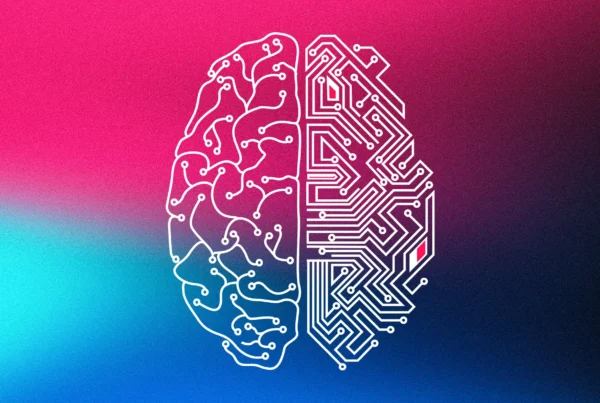
eCommerce has evolved remarkably over the past decade. What was once confined to dedicated websites has now seamlessly integrated into various platforms, from social media channels to in-app purchasing features, making online shopping more accessible and ubiquitous than ever. Intensifying competition compounded by modern shoppers’ fleeting attention spans and diminishing loyalties, businesses are under increasing pressure to innovate and adapt to stay ahead in the ever-evolving eCommerce landscape. Enter AI, the new darling of innovation. Fittingly dubbed the “new electricity” – AI’s impacts across eCommerce are transformative, streamlining operations and redefining customer experiences.
What is AI in eCommerce? Breaking Down the Basics
AI in eCommerce is the integration of artificial intelligence technologies into online retail operations to enhance and automate various aspects of eCommerce processes. We experience eCommerce AI every day when shopping online, such as product recommendations displayed during or after purchasing an item or while chatting with a virtual assistant. Of course, all of AI’s magic isn’t customer-facing – companies use artificial intelligence in eCommerce operations to predict demand, optimize stock levels, and monitor payment systems to flag suspicious transactions.
Understanding Artificial Intelligence in eCommerce
Before we expand on all the ways AI is improving eCommerce, it’s important to explain how it works. In simple terms, eCommerce AI is the integration of advanced algorithms and systems designed to mimic human intelligence. Leveraging machine learning, natural language processing (NLP), and vast amounts of data processing, AI can do in seconds what teams of people take hours, days, or weeks to achieve. For example, AI can analyze large datasets to identify purchasing trends, adjust inventory levels dynamically, and predict future demand with remarkable accuracy. On the customer side, AI can deliver hyper-personalized product recommendations based on search and purchase history while providing tailored marketing messages to engage shoppers more effectively.
Artificial intelligence eCommerce activities touch virtually every aspect of operations, from optimizing supply chain logistics to automating repetitive tasks to enhancing customer experiences from search to order to delivery. Although AI technology isn’t flawless, its ability to continuously learn and improve makes it an invaluable tool in eCommerce, where speed, accuracy, efficiency, and adaptability are essential.
The Top Benefits of AI for eCommerce Businesses

The utilization of AI in eCommerce isn’t necessarily new, as predictive AI has been modernizing eCommerce for years. However, generative AI is fast-tracking eCommerce growth and revolutionizing customer experiences by increasing productivity, fostering conversions, and supporting customer loyalty.
Personalization at Scale
Ecommerce AI enables businesses to create shopping experiences that resonate deeply with consumers. So much so that modern shoppers expect them whenever and wherever they shop. From tailored product recommendations to dynamic content personalization to targeted marketing campaigns, AI can make a customer feel like an individual rather than a number.
Smarter Inventory Management
AI supports more efficient, streamlined inventory management, which saves businesses time and money. Thanks to the ability to analyze vast amounts of data, including shopping trends, market conditions, and customer data, it can predict product demand. These predictive capabilities help optimize stock levels, preventing stock-outs while minimizing excess inventory.
Enhanced Marketing and Customer Engagement
Businesses employing AI in eCommerce benefit from improved marketing spend and ROI. Artificial intelligence’s ability to segment highly specific groups based on in-depth analysis of behaviors and preferences enables targeted ads and programmatic campaigns that feel personal and timely, increasing conversions.
How AI Personalization Has Changed the Way We Shop Online
AI in eCommerce is transforming conversions, igniting dynamic content personalization that supports purchasing persuasion. Ecommerce AI’s ability to adjust user content in real-time based on data analytics and user behavior enables hyper-personalization, steering consumers toward purchases more efficiently than ever before.
The Power of eCommerce Recommendation Engines
Ecommerce heavyweights like Amazon have mastered the art of AI-powered user recommendations. Product recommendations powered by AI eCommerce provide highly personalized suggestions for products and services that intuitively align with user behavior, increasing average order value and customer satisfaction.
Dynamic Pricing and Real-Time Adjustments
Like a modern crystal ball, AI in eCommerce excels at dynamic pricing and real-time adjustments to support data-driven pricing strategies at scale. By continuously analyzing demand, competitor pricing, and consumer behavior using AI integrations, businesses can remain competitive amid shifting market dynamics.
Chatbots and Virtual Assistants
Ecommerce chatbots and virtual assistants powered by AI drive increased customer satisfaction by providing instant support for customer queries, reducing response times. These AI-powered tools also deliver cost-effective support across every stage of the customer journey, streamlining operations by minimizing reliance on human customer service.
Predictive eCommerce AI Analytics
Predictive analytics for eCommerce is a game-changer, bridging the gap between customer expectations and operational efficiencies to maximize performance. Combining historical data, statistical models, and machine learning algorithms, eCommerce AI integrations can identify patterns and future outcomes to optimize product availability and prevent stockouts.
Automation Platforms for Marketing and Operations
Smart automation in eCommerce significantly impacts marketing and operations, driving efficiency, scalability, and precision. From effortlessly streamlining email campaigns to hyper-personalizing marketing messaging to optimizing supply chain workflows, the various AI-powered automation platforms available significantly impact marketing and operational efficiencies while optimizing customer experiences.
The Future of eCommerce AI: Trends to Watch

The eCommerce AI landscape is ever-evolving, shaping the future of online shopping with new possibilities and transformative innovations. Let’s explore upcoming trends to watch.
Generative AI in Product Content Creation
Generative AI in eCommerce is one example of a trend early adapters are integrating to gain a competitive edge. By leveraging advanced machine learning models like GPT (Generative Pre-Trained Transformer), businesses can efficiently produce engaging, high-quality, and scalable content across marketing and operations, from product descriptions to social copy, that resonates with customers, increasing engagement and loyalty.
Voice Search and Conversational eCommerce
The rise of voice-enabled shopping capabilities through AI assistants like Siri, Alexa, and Google Assistant is redefining how customers interact with brands, discover products, and complete purchases. These innovations use AI algorithms and NLP to support effortless shopping experiences by allowing users to interact with eCommerce platforms by simply voicing queries into devices like smartphones and smart speakers.
Staying Competitive with eCommerce AI
Studies suggest that incorporating AI can boost eCommerce revenue by up to 15% through improved customer engagement and personalized experiences. According to recent statistics, one in three U.S. business-to-consumer (B2C) organizations fully included AI-based technologies in their e-commerce operations, and another 47 percent of professionals said their companies are experimenting with artificial intelligence tools.1 For forward-thinking eCommerce companies focused on growth and sustainability, embracing eCommerce AI is no longer optional. It’s fast becoming a critical step in optimizing operations, enhancing customer satisfaction, and staying competitive in an increasingly competitive digital marketplace.
FAQs
What are the best uses of AI in eCommerce?
eCommerce companies can implement AI across multiple areas of operation to drive efficient operations and improved customer experiences, including AI-driven product recommendations, dynamic pricing, and personalized content; chatbots and virtual assistants; predictive analysis for sales forecasting, inventory, and supply chain management; and marketing automation.
How is AI transforming the shopping experience?
AI can transform virtually every aspect of eCommerce, from optimizing supply chain logistics to automating repetitive tasks to enhancing customer experiences from search to order to delivery. Leveraging machine learning, natural language processing (NLP), and vast amounts of data processing, AI can do in seconds what teams of people take hours, days, or weeks to achieve.
What is the future of AI in eCommerce?
AI is already embedded in many eCommerce experiences, and its innovation and adaption will continue at a rapid pace as businesses seek better marketing and operational efficiencies to save time and money while seeking to enhance user experiences to support robust purchasing opportunities and increased brand loyalty.
How does AI improve eCommerce personalization?
AI technology’s ability to adjust user content in real time based on data analytics and user behavior enables hyper-personalization, steering consumers toward purchases more efficiently than ever before.
What are the benefits of AI-powered recommendation engines in eCommerce?
Product recommendations powered by AI eCommerce provide highly personalized suggestions for products and services that intuitively align with user behavior, increasing average order value and customer satisfaction.
How can AI help optimize eCommerce operations and logistics?
AI supports more efficient, streamlined inventory management by analyzing vast amounts of data, including shopping trends, market conditions, customer data, and transportation logistics. It can predict product demand, help prevent stock-outs while minimizing excess inventory, and deliver optimized delivery updates.
What is the role of AI in enhancing customer experiences online?
AI integration into eCommerce operations and marketing enhances all aspects of the customer experience, including real-time customer support; dynamic and personalized product recommendations and user content; streamlining checkout processes; ensuring product availability; and more.
How does AI impact eCommerce marketing strategies?
eCommerce AI integration supports more personalized and efficient marketing strategies by harnessing AI’s ability to segment highly specific groups based on in-depth analysis of behaviors and preferences, enabling targeted ads and programmatic campaigns that feel personal and timely, increasing conversions.
Are there any risks to using AI in eCommerce?
One of the most significant risks involves data privacy and security concerns. AI relies on vast amounts of customer data to operate, attracting cyber criminals looking to collect payment information and personal data. Other concerns involve regulatory compliance around data privacy, unintentional bias by AI models, insensitivity to real-world events, and implementation challenges, including cost and poor data quality.
What are some examples of AI tools used in eCommerce?
Some common AI tools utilized in eCommerce today include AI assistants, like Siri and Alexa; Writesomic for eCommerce content; DALL-E for product visuals; PriceFX for dynamic pricing; and PredicitveAnalytics.ai for shopping behavior analysis.





